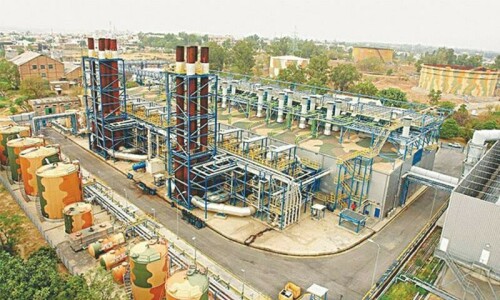
Harsh climatic conditions and unique topography have made Chitral region vulnerable to natural disasters, including glacial lake outburst floods (GLOF), which at times could wreak havoc in its human settlements.
Chitral, a mountainous region spread over about 15,000 square kilometres in extreme north of the country, has been prone to natural hazards which are hydrological, geo-climatic and man-made in nature.
During last one and a half decades, the area has been hit by several natural disasters, which claimed scores of human lives, swept away more than five villages and caused a colossal damage to the physical infrastructures, resulting in losses to the tune of Rs16 billion as per government reports.
GLOF seems to be the major potential danger in most of the 36 sub-valleys of Chitral valley, which has so far completely or partially washed away the villages of Sonoghur, Reshun Gol, Booni Gol, Unawuch Yarkhoon, Bindu Gol, Golen and Brep.
Chitral has 543 glaciers spreading over 4,000 square kilometres of which 116 have been declared as sensitive and 10 hyper-sensitive. Most of the glacial lakes are located in close proximity of the human settlements thereby posing a danger to them.
Chiantar is the largest glacier in Baroghil valley which is the origin of Chitral River. The river is known as Kabul River when it re-emerges from Afghanistan near Peshawar valley while in Chitral it enters the Kunar province after traversing a distance of 425 kilometres.
The Sonoghur village, known for its scenic beauty and romantic history, was wiped out in 2005 by GLOF forcing the villagers to migrate to Parwak village. Booni, the district headquarters town of Upper Chitral, is also vulnerable to the glacial lakes as it is situated at the foot of Booni Zone. Golen valley on Booni Road has more than seven glacial lakes of which one exploded on July 7, 2019, washing away three villages partially and damaging 108-megawatt hydropower station and water supply scheme of the city. The villagers anticipate explosion of several other glacial lakes in coming summer which are said to be quite ripe for outburst.
Flash floods have also increased in frequency and magnitude of devastation over the last couple of decades in different valleys of Chitral.
The valleys of Mulkhow, Torkhow, Karimabad, Sheshi Koh, Yarkhoon and Bumburate have been hit hard by flash floods in the past. The flash floods in July 2015 claimed the lives of 26 people in a small Phargam hamlet of Mulkow which occurred after a short spell of rain. In the same week, the villages of Shoghor and Broze were devastated by flash floods which rendered hundreds of families homeless and inundated thousands of acres of agricultural land and fruit orchards.
The villages on the bank of streams near highlands have been found vulnerable to such types of floods which occur when it rains in July and early August. In one case, the floodwater overflowed the road and suspension bridges and disconnected the affected villages from rest of the area for many days.
The snow avalanches also posed a potential threat to villages in the mountainous areas having steep landscape, as the Chitral’s sub-valleys of Karimabad, Parsan, Terich, Rech, Oveer, Madak Lusht, Washich and Yarkhoon have been found to be highly exposed to avalanches in the event of heavy snowfall.
As many as 18 people died when a snow avalanche hit the village of Washich in Torkhow area of Upper Chitral in 2004 as their houses were hit by the avalanche after skidding off the nearby pasture. The snow avalanches disrupted the road communication by running over the roads in March, April and May while crops and fruit orchards were also affected.
Besides, landslide incidents are also rampant, which in past have hit a number of villages both in the upper and lower parts of Chitral where fertile land and houses are sinking due to this hazard every year. The Riri village of Oveer valley has shrunk to a few houses while three decades ago there were more than 200 households. The villages of Kushum, Muzghol and Lone in Mulkhow valley, Melp in Torkhow, Sheshi Koh and upper part of Golain valley in lower Chitral are also being threatened by landslides. The entire population of a small Driyanu hamlet near Booni has migrated from the village during the last couple of years.
In addition, the unchecked depletion of peatlands for the last four to five decades in different valleys of Chitral can be cited as a man-made hazard, leading to degradation of the already fragile ecosystem. Chitral is said to have large chunks of peatlands spreading over about 5,000 hectares forming 20 per cent of total area of peatlands in the country.
The total area of peatlands in the country has been estimated at over 25,000 acres. Chitral is also stated to be one of the few areas containing this most precious ecosystem which is considered as the major store of terrestrial carbon.
Peatlands are wetlands with a thick layer of partially decayed vegetation and organic soil while the completion of the process takes almost hundred years. Though peatlands constitute three per cent of the earth surface, they store 30 per cent of the world’s soil carbon.
According to a study of Pakistan Wetland Programme conducted in Chitral in 2010, over 75 per cent peatlands had undergone total depletion only in Baroghil area in north of the district. The major reason for depletion of peatlands is the tremendous pressure exerted by local people who use their blocks as fuel for cooking and heating purposes as peats are highly combustible.
Published in Dawn, February 9th, 2020













































